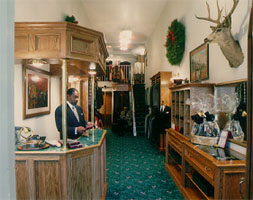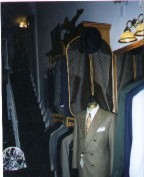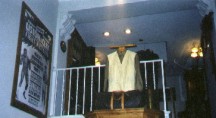Thomas
Moss, interview notes
So I think this is Black folks last
strong hold here in LA and we have something thatís definitely unique in
the United States. Black folks have this real niche and you wouldnít think
that, given how many Black folks there are, how are affluent Black folks
have become in the last 20 to 30 years. Youíll think that we have some
place that we could say, "Hey! Thatís the way Black folks do things." And
this is it, so thatís what we are doing here, I donít think it is going
to happen anyplace.
-
Thomas Moss, co-owner of Taylor, Holland
and Moss Distinctive Gentlemenís Wear
Thomas Moss, a co-owner of Taylor, Holland and Moss
Distinctive Gentlemenís Wear, a store that has  been
open for approximately five years now. Moss is both a life-long resident
and merchant in the area. He was born and raised in the heavily segregated
African-American eastside of Los Angeles. Moss is currently a senior employee
at a major aerospace engineering firm in Los Angeles. He resides in the
local and adjoining hill side neighborhoods of Leimert Park. His business
partners, Gary Holland and Bill Taylor, are both long-time friends who
also grew up in the immediate area and have lead successful careers that
have enable them to create this business partnership. Gary Holland is a
realtor, a barber and a collector. Many of the unique decorations, such
a stuffed deerís head and large gold framed original fight poster of Muhammad
Ali, is from Hollandís attic. Bill Taylor is a senior railroad conductor.
Thomas Moss also is an interior decorator and self-taught tailor. He personally
took part in the creation and decoration of the elegant, split level store.
been
open for approximately five years now. Moss is both a life-long resident
and merchant in the area. He was born and raised in the heavily segregated
African-American eastside of Los Angeles. Moss is currently a senior employee
at a major aerospace engineering firm in Los Angeles. He resides in the
local and adjoining hill side neighborhoods of Leimert Park. His business
partners, Gary Holland and Bill Taylor, are both long-time friends who
also grew up in the immediate area and have lead successful careers that
have enable them to create this business partnership. Gary Holland is a
realtor, a barber and a collector. Many of the unique decorations, such
a stuffed deerís head and large gold framed original fight poster of Muhammad
Ali, is from Hollandís attic. Bill Taylor is a senior railroad conductor.
Thomas Moss also is an interior decorator and self-taught tailor. He personally
took part in the creation and decoration of the elegant, split level store.
Creating a tailor store that was geared toward
the more fashionably conservative and business minded in both womenís and
menís dressing was a childhood dream of Moss and his partners.  As
a child he recalls "dressing in a button shirt and tie" for school and
other every day occasions. As a professional, Moss remarks, "I live in
the eastside, but I go to the westside to shop, because I could not find
the clothes that I wear." Moss explains the practical rationale that spawned
this idea.
As
a child he recalls "dressing in a button shirt and tie" for school and
other every day occasions. As a professional, Moss remarks, "I live in
the eastside, but I go to the westside to shop, because I could not find
the clothes that I wear." Moss explains the practical rationale that spawned
this idea.
One thing that made me go
into this business was the price of clothes in the malls. They used to
run me out of there. You know I like Armani suits as opposed to anyone
elseís. And, I could hardly afford to buy one a year. I knew that I could
custom make a suit for half of what I could pay for Armani. So I said,
"Oh, thatís a business." So, itís funny how things would be in your mind
and if you leave them there long enough and I guess if they are true enough
in your mind, it will just happen. Because the time that we decided to
do this, doing this was the furthest thing from my mind.ix
He was reminded of past conversations of starting
a business together by his current partners and long time friends.
From the sidewalk, the retail space is first seen
from its large window displays that encompass the entrance and allow a
clear view of the storeís elegant atmosphere of dark wood paneling, subtle
wall and floor coverings and neatly set merchandise. The store has been
constructed in two levels, with the upstairs used as a smaller, more private
dressing and measuring area. Patches of fabric, sketches and  fashion
magazines are carefully laid out for oneís viewing. Suits in various stages
of completion are next to a large three-sided mirror and step stool, waiting
for their respective bodies to clothe. Measuring tape, spools of thread,
needles and other trick of the tailoring trade are methodically located
nearby. From this high vantage point one can listen to the jazz music prevalent
in the main sales area while peering down into it. Here dark colored, neatly
pressed suits hanging meticulously on racks, or arranged stylishly on mannequins
before looking out onto the street where pedestrians, tables with wares
for sell and people seated around small patio tables and chairs.
fashion
magazines are carefully laid out for oneís viewing. Suits in various stages
of completion are next to a large three-sided mirror and step stool, waiting
for their respective bodies to clothe. Measuring tape, spools of thread,
needles and other trick of the tailoring trade are methodically located
nearby. From this high vantage point one can listen to the jazz music prevalent
in the main sales area while peering down into it. Here dark colored, neatly
pressed suits hanging meticulously on racks, or arranged stylishly on mannequins
before looking out onto the street where pedestrians, tables with wares
for sell and people seated around small patio tables and chairs.
This scene is a far cry from the previous use
of this space, a storage space and the original location of Fifth Street
Dickís Coffee House, which is now located three businesses away in a larger
space on the same block. Moss described it as dusty, with "light fixtures
hanging down to the floor, holes in the walls and cement floors" upon first
setting eyes upon it. Obviously, he and his partners did not waver at this
sight. Within the two years of purchasing the property and renovating it,
Taylor, Holland and Moss Distinctive Gentlemenís Wear is doing very well.
Their main methods of advertising are word of mouth, flyers sent out locally
and street traffic. The latter is may perhaps be the best form of advertisement
for the shop and the community as a whole. Moss explains that he, like
others in the communities, one day realized that Leimert Park was diamond
in the rough so to speak.
A lot of people just starting
coming over to Leimert Park. There were a lot of art galleries and a lot
happening here that you would pass by here all the times. But would never
think these things are happening. Dance collective, Kongo Square and poetry.
And you would just would never just think that "this" is happening right
here. Because I have people that would come to our shop and say," Oh, I
did not know that this was here. I pass by here all the time and I never
really just looked this way. I guess I never really just looked."
x
Moss describes his clientele as ranging from "brick
layers to popular entertainers." His most well known client is probably
Nancy Wilson, a former member of the Supremes singing group.
Explicit within Mossí comments is the reality
of class differences between African-Americans who have become well established,
and due to choice or involuntary segregation, live within close proximity
of those who have fared too well. Henry Louis Gates, Jr. proposes that
for "black America, these are the worst of timesÖand the best of times?"
However, Moss and his business partners venture
into Leimert Park juxtaposed Gates' recommendation of facing a reality
"that inner cities are not going to become oasis of economic prosperity
and corporate investment, and we should probably think about moving black
inner-city workers to the jobs rather than wait for new factories to resettle
in the inner city. " xii
Taking a different approach, Moss and his partners
are attempting to help make Leimert Park an "oasis of economic prosperity."
In addition to the various obstacles presented to African-Americans from
institutional racism in the job market to resource deprived public schools,
Moss offers his own reason, a more personal one, as to why collective power
among African-Americans has yet to occur.
I don't know if it's becasue
Blacks here came from slavery or
we got separated frm family and all
that-any kind of sense of
heritage and cultre that Black folks
haven't been able to come
together and work for the good of
all as opposed to individually-
you know individual successes. That
other cultures can come
here and they stick together and they're
not as many people as
we are-they may not be as educated
as we are as a whole, but
they have one thing-they stick together!
And they strive together
for the whole. And we don't have that
sense-you know we haven't
realized that that's our only salvation.
Don't expect the white man
do it for you-they are not going to
do it for you. You've got to do it
for yourself. xii
home
| moss interview
 As
a child he recalls "dressing in a button shirt and tie" for school and
other every day occasions. As a professional, Moss remarks, "I live in
the eastside, but I go to the westside to shop, because I could not find
the clothes that I wear." Moss explains the practical rationale that spawned
this idea.
As
a child he recalls "dressing in a button shirt and tie" for school and
other every day occasions. As a professional, Moss remarks, "I live in
the eastside, but I go to the westside to shop, because I could not find
the clothes that I wear." Moss explains the practical rationale that spawned
this idea.
 been
open for approximately five years now. Moss is both a life-long resident
and merchant in the area. He was born and raised in the heavily segregated
African-American eastside of Los Angeles. Moss is currently a senior employee
at a major aerospace engineering firm in Los Angeles. He resides in the
local and adjoining hill side neighborhoods of Leimert Park. His business
partners, Gary Holland and Bill Taylor, are both long-time friends who
also grew up in the immediate area and have lead successful careers that
have enable them to create this business partnership. Gary Holland is a
realtor, a barber and a collector. Many of the unique decorations, such
a stuffed deerís head and large gold framed original fight poster of Muhammad
Ali, is from Hollandís attic. Bill Taylor is a senior railroad conductor.
Thomas Moss also is an interior decorator and self-taught tailor. He personally
took part in the creation and decoration of the elegant, split level store.
been
open for approximately five years now. Moss is both a life-long resident
and merchant in the area. He was born and raised in the heavily segregated
African-American eastside of Los Angeles. Moss is currently a senior employee
at a major aerospace engineering firm in Los Angeles. He resides in the
local and adjoining hill side neighborhoods of Leimert Park. His business
partners, Gary Holland and Bill Taylor, are both long-time friends who
also grew up in the immediate area and have lead successful careers that
have enable them to create this business partnership. Gary Holland is a
realtor, a barber and a collector. Many of the unique decorations, such
a stuffed deerís head and large gold framed original fight poster of Muhammad
Ali, is from Hollandís attic. Bill Taylor is a senior railroad conductor.
Thomas Moss also is an interior decorator and self-taught tailor. He personally
took part in the creation and decoration of the elegant, split level store.
 fashion
magazines are carefully laid out for oneís viewing. Suits in various stages
of completion are next to a large three-sided mirror and step stool, waiting
for their respective bodies to clothe. Measuring tape, spools of thread,
needles and other trick of the tailoring trade are methodically located
nearby. From this high vantage point one can listen to the jazz music prevalent
in the main sales area while peering down into it. Here dark colored, neatly
pressed suits hanging meticulously on racks, or arranged stylishly on mannequins
before looking out onto the street where pedestrians, tables with wares
for sell and people seated around small patio tables and chairs.
fashion
magazines are carefully laid out for oneís viewing. Suits in various stages
of completion are next to a large three-sided mirror and step stool, waiting
for their respective bodies to clothe. Measuring tape, spools of thread,
needles and other trick of the tailoring trade are methodically located
nearby. From this high vantage point one can listen to the jazz music prevalent
in the main sales area while peering down into it. Here dark colored, neatly
pressed suits hanging meticulously on racks, or arranged stylishly on mannequins
before looking out onto the street where pedestrians, tables with wares
for sell and people seated around small patio tables and chairs.